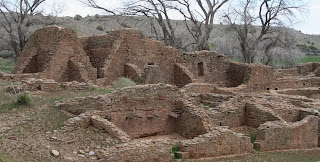 "though our longest sun sets at right Declensions andmakes but winter Arches, it cannot be long before we Lie down in darkness, and have our Light in ashes . . ."
"though our longest sun sets at right Declensions andmakes but winter Arches, it cannot be long before we Lie down in darkness, and have our Light in ashes . . ." Thomas Browne wrote his "Urn Burial" when some urns were discovered. Walcott feels that Africa is full of urns carrying dead bodies. The Great House (Africa) is now in ruins. The British lizard with dragon-like claws has swallowed the moth-like girls of Africa. The Guardians (gate-cherubs) of the gates had been slaughtered (streaked with strain). The African coach wheel could not move as the axle had been clogged (like a cart immobilised by cattle droppings).
The Poet's Farewell to the Fields and Groves of Africa: His Reminiscences of Africa:
The country has only eucalyptus trees. Crows are its only birds. Its lime trees are dead and stinking. The British Empire is leprous and contaminated. The poet sadly bids farewell to the green fields and the happy groves of Africa, which are no more.
Africa was once beautiful. It was polished like marble, but now it was a symbol of struggle, like Faulkner's South (of America, where the haves and the have nots clash). Its temporary deciduous beauty is gone. The trees near the lawn are diseased (rashes). They have already shed their leaves. These leaves cover dead animals or human beings. Obviously the colonial rulers have robbed Africa of its wealth and destroyed its people.
The Moral Death of the Great British Empire:
Now, it appears as if Africa has only lime trees, which grow in the silt, not in pure waters (corrosive and corrupt people). The British imperious rakes have carried away the African beauties. The African life (river) flows and the past hurt is slowly forgotten. The great artists of Africa, the craftsmen, have been banished. Now, the great house is worm-eaten ... ...
[For the complete, free essay via email, reach the blogger at rufusonline@gmail.com]

